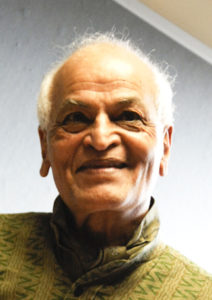By Satish Kumar
Education Fit for the Future
We need to make education as if people and planet matter
The current educational system was designed to meet the needs of the Industrial Age, the age of mass production, mass consumption and unlimited economic growth. Young people needed to be trained in whatever skills were required by the market. This was an education for jobs rather than an education for life. Many of the jobs, for which students were trained, led to the decline in biodiversity, to the exploitation of Nature and a significant increase of carbon emissions which have contributed to climate catastrophe.
But we are now entering a new era, the era of the environment, so we need a new system of education which can respond to our times and can help to develop a Nature friendly culture and a planet friendly economy.
This was the context which inspired the Foundation of Schumacher College in 1991 in Devon. At Schumacher College students learn from Nature, in nature and about Nature. While they study Nature they also live a Nature friendly life. They garden, they cook and they enjoy a vegetarian diet. This forms a holistic approach to education – education of head, heart and hands. We call it learning by doing, combining knowledge with experience.
Recently world leaders met at the COP26 in Glasgow. They did their best to find ways and means to halt carbon emissions, safeguard biodiversity and preserve environmental integrity. They talked about a change in government policies, a change in business practices and a need for new technologies to address the urgency of climate change. These are good intentions and good aspirations.
But the new policies and the new technologies government and industry are hoping and planning to implement can only go so far. We must also transform education and learn a new way of living with ourselves, with one another and with our Planet Earth. This can only happen if we revolutionise our educational system and put the integrity of Nature at the heart of educational institutions.
The global educational system looks at nature and sees it only as a resource for the economy. Thus, Nature becomes a means to an end and the end is economic growth. In this paradigm humans too are considered to be a resource for the economy. They are labelled ‘human resources’. Thus, people are treated as a means to an end.
At Schumacher College our students are taught that the economy should be the means to support the wellbeing of people and the sustainability of Planet Earth. In our vision of education Nature is not simply a resource for the economy, rather Nature is recognised as the source of life itself. Nature and humans are not separate. We are all an integral part of Nature. Only by making this kind of shift in our thinking can we reach the destination of zero waste, zero pollution and zero carbon emissions by 2050.
In order to establish a Nature friendly economy and Nature friendly politics we also need Nature friendly education; education as if people and planet matter. We need to engage in the study and understanding of the intricate web of life and ask: “What is a healthy and regenerative relationship between humans and Nature?”. Maintaining and sustaining the integrity of Planet Earth has to be at the centre of any new curriculum. Our hope is that the example of Schumacher College will facilitate a change in thinking, so that in the near future knowledge of the eco-system and understanding of the natural world will be made available to all young people in every school and university.
The knowledge of ecology and experience of Nature have been exiled from the mainstream educational process. As a result, ecology and economy have been separated. Education of this kind disconnects people from the natural world. This is a great tragedy. Education, as it is practised in the world today is not fit for the future.
Post COP 26 we need to ask leaders from universities, colleges, and schools of the world, “How is the educational system going to respond to the challenge of climate change?” and, “How do we reset education so that it is in harmony with the natural world?”
To address the challenge of climate catastrophe new technologies are not enough, we need a new mindset, new economic values, a new worldview. And to achieve this transformation we need an Earth friendly educational system.
On this occasion of the 30th anniversary of Schumacher College, I urge students, teachers, parents and politicians to re-think and redesign the curriculum of schools and universities and transform the system so that we can have Education as if people and planet matter.

Satish Kumar is the founder of Schumacher College and the author of Soil, Soul and Society.
For further information please visit: https://campus.dartington.org/schumacher-college/


